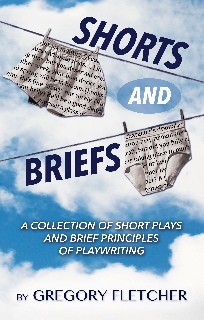LET ME BE BRIEFS
The title of Gregory Fletcher’s Shorts and Briefs doesn’t refer to an underwear drawer but rather to a collection of nine short plays along with sixteen brief chapters that share advice, tips, and principles on playwriting. Although the book’s primary focus is on playwriting, there’s plenty of good advice that applies to all genres of creative writing. Not only is there crucial guidance for student writers but plenty for established playwrights, especially those overproduced hot-to-the-scene Broadway writers who turn out creative dialogue but can’t tell a story.
The typical chapters on structure, building a character, and dialogue (“typical” because such subjects are obligatory for any book on playwriting) are extremely easy to follow and comprehend. Fletcher’s success is that he remains clear and concise throughout. I was nicely surprised to find further advice that goes beyond the typical craft book on writing: “Fill Up the Trunk” stresses the importance for a writer to continue with the next project; “Emotion is Sweat” reminds writers to keep sentimentality in check; and “Surviving the Business” touches upon topics  applicable to all artists and human beings alike, but unfortunately are rarely offered, even at the graduate level. I especially enjoyed his take on “survivor job,” the spelling difference between “theater vs. theatre,” and why he prefers the term “short play vs. ten-minute play.” The book concludes with an impressive and comprehensive vocabulary list.
applicable to all artists and human beings alike, but unfortunately are rarely offered, even at the graduate level. I especially enjoyed his take on “survivor job,” the spelling difference between “theater vs. theatre,” and why he prefers the term “short play vs. ten-minute play.” The book concludes with an impressive and comprehensive vocabulary list.
Fletcher may not be a well-known name in the business, but highly respected writers Christopher Durang, Tina Howe, and Charles Busch offer corroborating blurbs on the back cover. It doesn’t take long to see why such notables support his book. Among other wisdoms, I especially enjoyed that he validated why so many short plays get on my nerves: I’ve always objected that most of the Fringe Festival faves and ubiquitous 90-minute, no-intermission plays are silly skits, one-joke gags, or pointless, juvenile entertainments. Fletcher confirms my impatience in the chapter “Short Play Vs. Sketch Vs. Scene” because most produced short plays are in fact sketches or scenes—not short plays at all—and the differences are highlighted.
Within his collection, no two plays are alike. His Stairway to Heaven, which won the National Ten-minute Play Award from the Kennedy Center American College Theater Festival, has at its core estranged teenage siblings who become reconnected on the day of their father’s funeral, so it’s perfect for high school and college actor and/or director courses. From teenage problems to the issues of a mature couple in their 50s (Robert Mapplethorpe’s Flowers), to looking to belong (Family of Flechner), to surviving tragedy (The Nine-Month Fix), to coming home (Not Tonight), to the power of extended family (The Moon Alone), to mysteries (Eight Times Around), to romance (Roast Beef and the Rare Kiss), and to mind games (Hangman), the playwriting elucidates that Fletcher puts his money where his mouth is. His shorts are a terrific tool for young actors and directors to hone their craft, which means his book isn’t just for student writers.
Shorts and Briefs, A Collection of Short Plays and Brief Principles of Playwriting
by Gregory Fletcher
Northampton House Press
available in hard copy or digitally at Amazon

